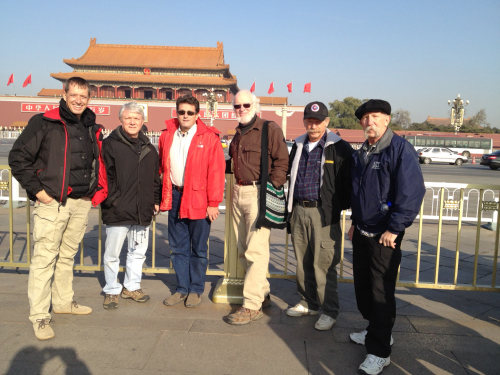Americans and N. Koreans working together to build homes near Pyongyang
American volunteers are aiming to build better relations with North Korea by constructing new homes for people living in the communist country.
A team from the U.S. Christian non-profit organization Fuller Center for Housing is currently working with ordinary North Koreans to build 50 homes near the country’s capital.
The six volunteers, who arrived on Dec. 6, are helping to build 25 energy-efficient duplex buildings 16 kilometers north of Pyongyang, where 200 families are living and working at a tree nursery.
The North Korean government has also pledged to build another 150 homes at the site that provides trees to a large part of the country.
North Korea’s housing shortage was exacerbated by Typhoon Ewiniar, which destroyed an estimated 30,000 houses when it swept through the country in 2006.
FCH has worked with North Korea’s Paektusan Academy of Architecture to design the new homes that will use renewable energy and passive solar design ― a form of architecture that utilizes the sun’s energy to heat and cool buildings. Each family unit is costing around $25,000 to build, taking the total cost of the project to around $1 million.
“This is unlike anything The Fuller Center has ever undertaken,” said FCH President David Snell, stressing that the project is only using donations specifically designated for work in North Korea.
 |
American volunteers (from left) Rob Beckham, Frank Purvis, Dave West, Earl Martin, Charlie Thell and Tim DuBois stand in front of Beijing’s Forbidden City while waiting in China for their visas to be approved before arriving in North Korea on Dec. 6. (FCH) |
“It is our hope that as the designs are refined and tested in various sites around the North Korean countryside, they will then set the stage for adaptation to other countries which have similar conditions of bitterly cold winters and frequent shortages of energy sources.”
Although the communist North Korean system does not allow private home ownership, families have a lifetime right of occupancy and their homes are often passed down to their heirs.
“This project represents a leap of faith, multiple leaps of faith,” Snell added.
“The Fuller Center is stepping out with the firm belief that, while some may harshly judge us for this initiative, people of goodwill will rally behind it, providing the resources to make this dream a reality. It’s a leap of faith for the Koreans, as well, whose history has taught them to be skeptical of outsiders, yet they are welcoming American volunteers with graciousness and warmth.
“There is a need for the Fuller Center to do what it is called to do ― build houses. But an equally important objective in this project is peacemaking and trust building between our countries.
“It is a true mission of peace. Working side-by-side with Koreans, these volunteers and the many who follow them will be one small part of a process to change the way Americans and Koreans see one another.”
The initiative has been endorsed by former U.S. president Jimmy Carter and is officially sponsored by North Korea’s Asia-Pacific Peace Committee, which has been working with FCH since 2008.
“Sometimes international relationships are based on the assumption that it is advantageous to raise the level of fear so as to evoke compliance from the other, but rarely does fear lead to wise or wholesome responses,“ said project volunteer Earl Martin, from the U.S. state of Pennsylvania.
“More often, fear leads to reckless or defensive behavior.”
“We go, rather, with the opposite premise: that we are all likely to build healthier relationships if fear and suspicion are reduced. So we are happy for this unique opportunity to join with the people of North Korea to build houses, to build trust, to build peace.”
FCH works in 16 countries as well as in more than 60 U.S communities to provide people with decent, affordable housing.
By Kirsty Taylor (
kirstyt@heraldcorp.com)








